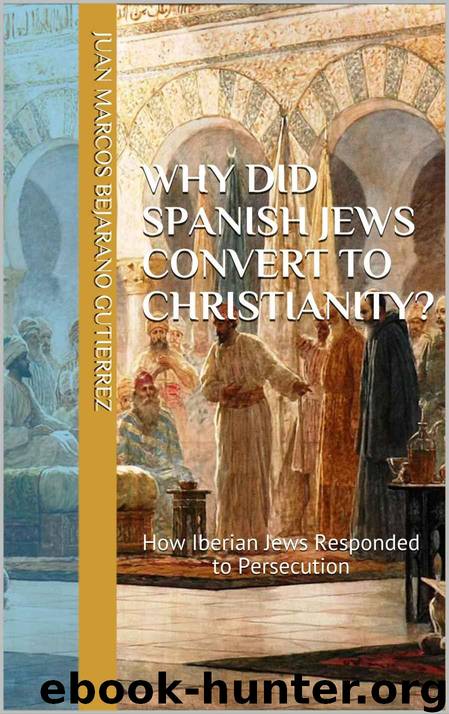Why Did Spanish Jews Convert to Christianity?: How Iberian Jews Responded to Persecution by Juan Marcos Bejarano Gutierrez

Author:Juan Marcos Bejarano Gutierrez
Language: eng
Format: azw
Publisher: Yaron Publishing
Published: 2019-08-23T22:00:00+00:00
chapter 7
The Collapse of Faith
We have already briefly reviewed the opinion that philosophy and rationalism played a significant role in the demise of Jewish fidelity to Judaism in the 14th and 15th centuries. The problem with this position, while supported by four contemporary Jewish writers lies in the simple fact that no record of any notable Jewish philosophers converting or abandoning Judaism exists. If the philosophical movement had indeed been the primary component of Jewish communal collapse, it might be expected that at least some noted Jewish philosophers would have converted to Christianity. In response to this, Allan and Helen Culter offer the following scenario:
“The majority of the Jewish Aristotelians in fourteenth-century Spain did not carry their philosophical beliefs out to their ultimate conclusions. But a small minority did, and this minority apparently exerted an increasing influence upon the Jewish upper class…”[110]
Who these philosophers were is not clear. Also, Cutler and Cutler offer a series of reasons why Jewish communal life collapsed at the end of the 14th century and well into the 15th century. Their possible explanations range from Spanish Jewry’s strong power drive, the impact of the Spanish civil war, the role of philosophy, the role of mysticism, and the belief in reincarnation, among others. What is clear, I believe is that the internal makeup of the Jewish community changed radically regarding its leadership. Philosophy and mysticism certainly played a role in this decline, but not in a manner that they are typically assumed to have.
The rise of the Converso phenomena is partly connected to the undermining of Jewish religious institutions. According to Jose Faur, the rise of the anti-Maimonidean movement, as well as the changing nature of rabbinic leadership in the Iberian Peninsula, led to the gradual collapse of Jewish communal life and leadership. The prevailing view also holds that the anti-Maimonidean forces held the line against assimilationist trends engendered by the rationalistic and philosophic camps of the pro-Maimonideans.[111] The anti-Maimonidean forces are generally considered the authentic expression of Judaism.
In his article, Anti- Maimonidean Demons, Jose Faur, notes the simple point that the mass apostasy to Christianity took place after and not before the attack on Maimonides. This is a point ignored mainly by those placing blame on the impact of philosophical speculation on those who converted. Conversely one may argue that Faur’s contention that the radical change in Jewish leadership and philosophical outlook in the Peninsula set the stage for the conversions should be muted since they occurred two hundred years after.
Instead, Faur contends, the opposite is true, and the anti-Maimonidean forces far from embracing a more authentic Jewish expression were reflective of assimilation of prevailing Christian attitudes towards philosophy and humanistic studies. Faur states:
“Unknowingly, the anti-Maimonideans promoted Christian ideology. It should be emphasized that they were not conscious of their mental assimilation. Their opposition fostered the illusion of total autonomy, barring an analysis of the basic elements affecting their own thinking process.”[112]
Perhaps the most controversial aspect of Jose Faur’s proposition is as follows:
“A mark of
Download
This site does not store any files on its server. We only index and link to content provided by other sites. Please contact the content providers to delete copyright contents if any and email us, we'll remove relevant links or contents immediately.
Genius & Anxiety by Norman Lebrecht(802)
A Chosen Few by Mark Kurlansky(781)
Going Home by Raja Shehadeh(680)
The Aleppo Codex: A True Story of Obsession, Faith, and the Pursuit of an Ancient Bible by Matti Friedman(674)
Righteous Victims by Benny Morris(672)
A history of Zionism by Walter Laqueur(668)
The War Against the Jews: 1933–1945 by Lucy S. Dawidowicz(646)
Complete Works of Josephus by Josephus(620)
The Israel-Arab Reader by Walter Laqueur(588)
Legacy by Thomas Harding(579)
Rome and Jerusalem : the clash of ancient civilizations by Goodman Martin 1953-(575)
The Rise of the Roman Empire (Classics) by Polybius(561)
We Stand Divided by Daniel Gordis(539)
Tehran Children by Mikhal Dekel(513)
The Secret History by Procopius(513)
A History of Zionism by Walter Laqueur(507)
Ethics (Translated & Annotated) by Baruch Spinoza(502)
Jewish Terrorism in Israel by Pedahzur Ami & Arie Perliger(500)
Hitler's First Victims by Timothy W. Ryback(491)
